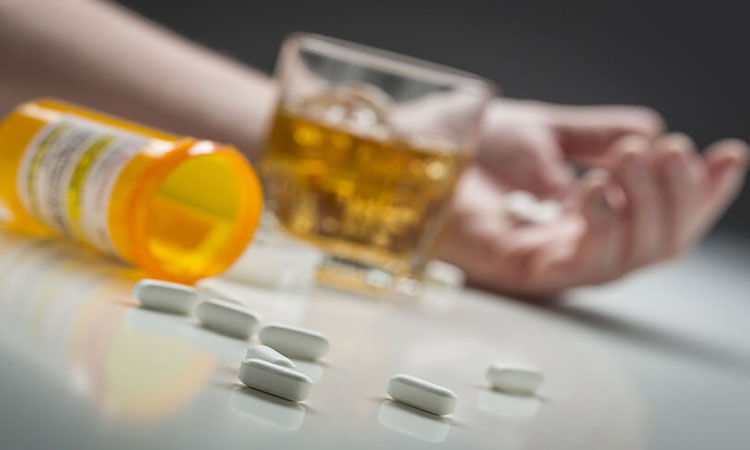
The Dangers of Combining Oxycodone and Alcohol – Combining alcohol with any other intoxicating substance can be dangerous and result in unpredictable side effects. However, mixing oxycodone, a prescription painkiller, with alcohol can result in some unique problems. Oxycodone is an opioid analgesic indicated to treat moderate to severe pain, and it is often combined with acetaminophen in brand-name drugs (e.g., Percocet).
Oxycodone and Alcohol
When used as directed, oxycodone is effective at treating pain after an injury, surgery, or illness. Oxycodone is intended for short-term treatment, and due to its high potential for addiction, this drug should not be used to treat chronic pain, except in cases involving cancer or palliative care.
Because oxycodone reaches the bloodstream rapidly and effects abate within four to six hours, the use of this drug often triggers abuse, dependence, and addiction. People who misuse oxycodone may also drink alcohol in an attempt to intensify the effects of the opioid. Importantly, however, combining opioids and alcohol can result in a life-threatening overdose, and in the case of Percocet, mixing alcohol and acetaminophen can quickly lead to liver damage.
Increasing Risks When Combining Percocet and Alcohol
Both oxycodone and alcohol can produce feelings of pleasure and relaxation. Alcohol compounds the sedative effects of oxycodone, and this can be very hazardous, as the person could pass out, resulting in physical injury from a fall. They could also vomit while unconscious, causing the person to choke and possibly aspirate on their own vomit.
However, because they are both central nervous system depressants, the primary cause of complications when oxycodone is used in combination with alcohol is respiratory depression. If this occurs, the person’s breathing will slow, become very shallow, labored, irregular, or even stop entirely. This causes oxygen deprivation, and without immediate medical treatment, organs begin to fail, eventually resulting in death.
Symptoms of Oxycodone and Alcohol Use
The combined effects of alcohol and oxycodone are comparable to mixing alcohol with other opioids. Both drugs slow breathing, can result in drowsiness, and impair coordination. People who abuse alcohol and oxycodone simultaneously also exhibit impaired judgment and may be a danger to themselves and others. Furthermore, the presence of opioids reduces a person’s tolerance to alcohol.
A person who combines oxycodone and alcohol may appear as if they are just extremely intoxicated, but the two substances intensify the effects of one another and can cause complications that are much more dangerous.
Effects of concurrent oxycodone and alcohol use include the following:
- Constipation
- Poor focus or concentration
- Low blood pressure
- Liver failure
- Heart attack
- Respiratory depression
- Coma
- Death

Treating an Opioid Overdose
Naloxone is a medication that is vital for treating individuals who are overdosing on opioids. The Centers for Disease Control and Prevention (CDC) state that around 115 people die of overdoses related to opioids in the U.S. every day. For this reason, first responders and caregivers are increasingly carrying naloxone in case they need to rapidly reverse an opioid overdose to save someone’s life.
Naloxone is effective at reversing opioid overdoses but may be less effective when other substances are in a person’s system. Moreover, combining oxycodone and alcohol will make treating an oxycodone overdose more difficult.
Percocet and Alcohol
As noted, oxycodone is commonly used in formulations that include acetaminophen. In recent years, medical professionals have voiced concern over the number of overdoses related to acetaminophen use. While it is not easy to accidentally overdose on acetaminophen on its own, it can be found in a number of over-the-counter (OTC) medications, such as cold and flu formulations, headache treatments, allergy medications, and even sedatives used to help with sleep.
Not very many OTC medications contain more than 325 mg of acetaminophen in each recommended dose, and these doses are spaced out as directed to avoid liver complications or an overdose. When a person combines medications such as cold and flu drugs with OTC painkillers, however, they are more likely to intake more than the recommended maximum of 4,000 mg per day without being aware of it.
Unfortunately, accidental acetaminophen poisoning can result in liver damage or even liver failure. Alcohol itself is notorious for its association with liver disease, so combining large amounts of alcohol with acetaminophen dramatically increases the likelihood of damage to the liver.
Treatment for Oxycodone and Alcohol Abuse
When a person is abusing two or more substances, this is referred to as polysubstance abuse. Conditions related to both substance must be treated in conjunction to achieve the best outcome for the person suffering.
Polysubstance abuse is most effectively treated using an integrated approach to addiction that includes evidence-based services vital for long-term recovery, such as behavioral therapy, counseling, and group support.
Recovery By The Sea employs compassionate addiction specialists who deliver these services to clients with care and expertise. If you or someone you love is abusing oxycodone and alcohol or any other substances, contact us today to discuss treatment options. Discover how we can help you reclaim your life from addiction!